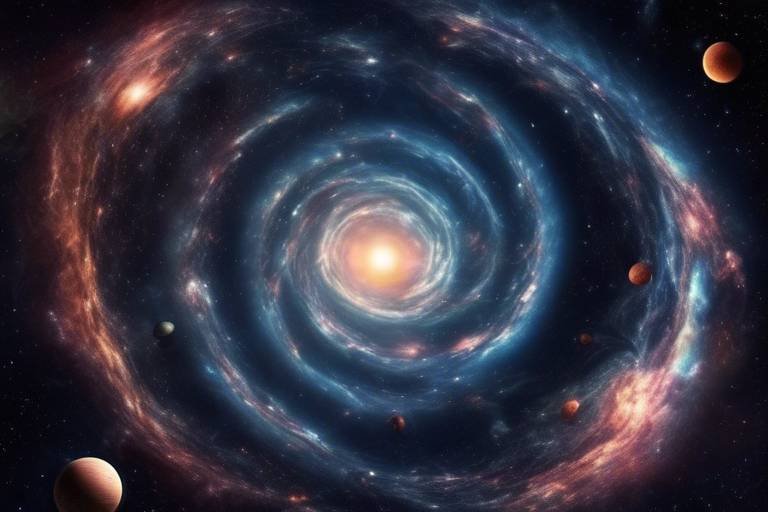How does Metaphysics Intersect with Science?
Have you ever pondered the big questions of existence? Questions like "What is reality?" or "What does it mean to know something?" These profound inquiries are the realm of metaphysics, a branch of philosophy that explores the fundamental nature of reality, existence, and the universe. On the other hand, we have science, a systematic enterprise that builds and organizes knowledge through observation and experimentation. At first glance, these two fields may seem worlds apart, but they are more intertwined than you might think. This article explores the intricate relationship between metaphysics and science, highlighting how philosophical inquiries influence scientific understanding and vice versa.
Imagine metaphysics as the blueprint of a house, while science is the construction process. The blueprint outlines what the house is supposed to look like and how it should function, much like metaphysical theories provide a framework for understanding the nature of reality. Science, however, is the hands-on work of building that house, using materials and tools to bring the blueprint to life. But what happens when the blueprint is flawed or incomplete? This is where the intersection of these two disciplines becomes crucial. Philosophical questions can challenge scientific assumptions, prompting researchers to rethink their methods and conclusions. In this exploration, we will delve into various aspects of this relationship, examining how metaphysical concepts shape scientific inquiry and how scientific discoveries can, in turn, reshape our metaphysical beliefs.
As we embark on this journey, we will uncover key themes such as the nature of reality, the role of observation, and the implications of groundbreaking scientific discoveries. We will also look at how interdisciplinary research between scientists and philosophers can lead to innovative solutions to complex questions, enriching both fields. So, buckle up as we navigate through this fascinating intersection of metaphysics and science, where thought-provoking ideas meet empirical evidence!
The nature of reality is perhaps one of the most profound questions we can ask. Metaphysics delves into concepts such as existence, objects, and their properties, all of which lay the groundwork for scientific theories and models. For instance, when scientists propose theories about the universe, they often rely on metaphysical assumptions about the nature of space, time, and causality. These assumptions can significantly influence the direction of scientific inquiry and the interpretation of results.
Consider the concept of time. Metaphysically, is time an absolute entity, or is it merely a construct of human perception? This question has profound implications for physics, particularly in theories like relativity, where time is treated as a dimension intertwined with space. If we accept that time is flexible and relative, our understanding of the universe's workings shifts dramatically. Thus, metaphysical questions about the nature of reality not only fuel scientific inquiry but also challenge scientists to reconsider their foundational beliefs.
Scientific methodologies are not immune to metaphysical influences. The very way scientists conduct experiments and interpret data is often shaped by underlying metaphysical assumptions. For instance, the belief in an objective reality that can be observed and measured is a cornerstone of the scientific method. However, what happens when these metaphysical assumptions are questioned? This can lead to significant shifts in how we understand and interpret scientific findings.
Epistemology, the study of knowledge, plays a crucial role in science. It addresses questions about the nature and scope of knowledge, including what constitutes valid scientific knowledge. Our metaphysical beliefs about truth and knowledge can heavily influence scientific practices. For example, if one believes that knowledge is entirely objective, they may disregard subjective experiences that could provide valuable insights into scientific phenomena.
The debate between objective and subjective knowledge is a prime example of how metaphysical perspectives shape scientific understanding. Objective knowledge is often seen as the gold standard in science, but subjective experiences can reveal nuances that purely objective measurements might overlook. For instance, in fields like psychology and sociology, understanding human behavior requires a blend of both objective data and subjective interpretation. This interplay raises questions about the validity of scientific knowledge itself.
Observation is fundamental to the scientific method, but how we interpret observations is deeply influenced by metaphysical views on reality. If one holds a metaphysical belief that reality is fundamentally chaotic and unpredictable, they may approach scientific observations with a different mindset than someone who believes in a more deterministic universe. This can lead to varying interpretations of the same empirical data, highlighting the importance of metaphysical assumptions in shaping scientific conclusions.
Groundbreaking scientific discoveries often challenge traditional metaphysical views. Take quantum mechanics, for example. The strange behaviors of particles at the quantum level have forced philosophers and scientists alike to reevaluate concepts of existence, causality, and even the nature of reality itself. Such discoveries prompt profound philosophical discussions and can lead to a reevaluation of long-held beliefs about the universe.
Despite their differences, there are instances where science and metaphysics converge. Collaborative efforts between scientists and philosophers can lead to a richer understanding of complex questions. Interdisciplinary research can yield innovative approaches that integrate metaphysical insights into scientific exploration, enhancing our grasp of existence.
Interdisciplinary research between scientists and philosophers reveals the benefits of merging these two fields. By engaging in dialogue, both parties can challenge each other's assumptions and broaden their perspectives. This collaboration can lead to groundbreaking discoveries and a more profound understanding of the universe. For example, discussions about consciousness and the nature of the mind often require insights from both neuroscience and philosophy.
Looking ahead, the intersection of metaphysics and science holds exciting potential. Emerging technologies and theories may reshape our understanding of reality and existence in ways we can hardly imagine. As we continue to explore the universe, the philosophical questions will evolve, prompting new inquiries and discoveries. The dialogue between these two fields is far from over; in fact, it is just beginning.
- What is metaphysics? Metaphysics is a branch of philosophy that explores the fundamental nature of reality, existence, and the universe.
- How does science relate to metaphysics? Science relies on certain metaphysical assumptions, such as the existence of an objective reality, which influences scientific methodologies and interpretations.
- Can scientific discoveries change metaphysical beliefs? Yes, groundbreaking scientific discoveries often challenge traditional metaphysical views and can lead to a reevaluation of philosophical concepts.
- What is the significance of interdisciplinary research? Interdisciplinary research allows scientists and philosophers to collaborate, leading to innovative solutions and a deeper understanding of complex questions.

The Nature of Reality
When we dive into the depths of metaphysics, we're essentially asking the big questions: What is reality? Is it simply what we can see and touch, or is there more beneath the surface? These inquiries don't merely float in the realm of philosophy; they play a pivotal role in shaping scientific theories and models. Think of metaphysics as the foundation of a house, while science is the structure built upon it. Without a solid foundation, the house—our understanding of the universe—would crumble.
To illustrate this point, consider the concept of time. In metaphysics, time is often debated: Is it linear, cyclical, or perhaps even an illusion? Scientists, particularly physicists, grapple with these notions as they develop theories about the universe. For instance, Einstein's theory of relativity reshaped our understanding of time, suggesting that it is not a constant but rather a flexible dimension influenced by speed and gravity. This groundbreaking idea stems from a metaphysical inquiry into the nature of reality itself.
Moreover, metaphysical questions about existence and causality challenge scientists to reconsider their assumptions. For example, when we talk about the Big Bang, we're not just discussing a scientific event; we're also probing the metaphysical implications of what it means for something to come from nothing. This intersection of ideas prompts a cascade of questions that can leave us pondering our very existence: What existed before the Big Bang? Is the universe infinite, or does it have an edge?
In exploring these metaphysical questions, scientists often find themselves at a crossroads. They must decide whether to adhere strictly to empirical evidence or to entertain philosophical possibilities that may not yet be measurable. This is where the beauty of the scientific method comes into play, as it allows for the integration of both observational data and philosophical inquiry. The interplay between these two realms can lead to profound discoveries and a richer understanding of reality.
Ultimately, the nature of reality is not just a philosophical puzzle; it's a dynamic conversation between metaphysics and science. As we continue to explore the universe, we must remain open to the profound implications of our findings and the philosophical questions they raise. The relationship between science and metaphysics is like a dance—sometimes leading, sometimes following, but always intertwined in a quest for deeper understanding.

Scientific Methodology
The realm of is not just a systematic approach to inquiry; it is a fascinating interplay of metaphysical assumptions and empirical investigation. At its core, scientific methodology involves formulating hypotheses, conducting experiments, and analyzing data to draw conclusions about the natural world. However, lurking beneath this structured facade are profound metaphysical questions that shape how scientists interpret their findings. For instance, the assumption that the universe operates according to consistent laws is a metaphysical stance that underpins every scientific endeavor. Without this belief, the very act of experimentation would seem futile, as there would be no expectation of repeatable results.
Moreover, the way scientists design their experiments is heavily influenced by metaphysical considerations. For example, when selecting variables to manipulate and measure, researchers must consider what constitutes a valid cause-and-effect relationship. This leads us to ponder: are we merely observing the surface of reality, or are we uncovering deeper truths? The philosophical foundations of scientific inquiry compel scientists to grapple with these questions, pushing them to refine their methodologies continually.
One critical aspect of scientific methodology is the role of epistemology—the study of knowledge itself. Scientists often operate under certain epistemological frameworks that dictate what they consider valid evidence. This is where metaphysical beliefs about knowledge come into play. For instance, a scientist who holds a realist perspective may assert that the universe exists independently of our observations, while an idealist might argue that reality is shaped by our perceptions. These differing views can lead to contrasting interpretations of the same experimental data.
Furthermore, the interpretation of experimental results is not merely a technical process; it is steeped in philosophical implications. Consider the famous double-slit experiment in quantum mechanics, which challenges our traditional notions of observation and reality. When particles are observed, they behave differently than when they are not. This phenomenon raises questions about the nature of existence itself and whether reality is objective or subjectively constructed. As such, scientists must navigate these metaphysical waters carefully, ensuring that their methodologies remain robust while acknowledging the underlying philosophical currents.
In summary, the intersection of metaphysics and scientific methodology is a rich tapestry of ideas that informs how we understand the universe. As scientists continue to push the boundaries of knowledge, they must remain attuned to the philosophical implications of their work. By recognizing the metaphysical assumptions that underpin their methodologies, scientists can engage in a more profound exploration of reality, ultimately leading to a more nuanced understanding of existence itself.
- What is scientific methodology? Scientific methodology refers to the systematic approach that scientists use to conduct research, including formulating hypotheses, conducting experiments, and analyzing data.
- How does metaphysics influence scientific methodology? Metaphysical assumptions shape the way scientists interpret their findings, design experiments, and understand the nature of reality.
- What role does epistemology play in science? Epistemology examines the nature and scope of knowledge, influencing how scientists determine what constitutes valid evidence and knowledge in their research.
- Can scientific discoveries challenge metaphysical views? Yes, groundbreaking scientific discoveries, such as those in quantum mechanics, often challenge traditional metaphysical views and prompt reevaluations of philosophical concepts.

Epistemology in Science
When we dive into the realm of epistemology in science, we are essentially exploring the very foundation of how we know what we know. It raises pivotal questions like: What constitutes knowledge? How do we differentiate between belief and truth? These inquiries are not just academic exercises; they profoundly influence scientific practices and the way we interpret findings. For instance, consider how different scientists may approach the same set of data yet arrive at contrasting conclusions based on their underlying beliefs about knowledge and reality.
At the heart of epistemology lies the distinction between empirical knowledge—knowledge gained through observation and experimentation—and theoretical knowledge, which is derived from abstract reasoning and models. This distinction is crucial because it shapes how scientists formulate hypotheses and develop theories. Scientists often rely on empirical evidence to support their claims, yet the interpretation of this evidence can be heavily influenced by their metaphysical beliefs. For example, a scientist who adheres to a strict materialistic view may interpret data differently than someone who believes in a more holistic or interconnected view of the universe.
Moreover, the acceptance of scientific knowledge is not merely a matter of data and evidence; it also involves a social dimension. The scientific community operates within a framework of shared beliefs and values that dictate what is considered valid knowledge. This means that epistemological assumptions can lead to biases in what is studied and how findings are reported. A classic example is the historical resistance to the acceptance of the heliocentric model proposed by Copernicus, which challenged the prevailing metaphysical beliefs of the time.
To illustrate this further, let’s consider a table that outlines the different epistemological approaches in science:
| Epistemological Approach | Characteristics | Implications for Science |
|---|---|---|
| Empiricism | Knowledge comes from sensory experience | Emphasis on experimentation and observation |
| Rationalism | Knowledge is gained through reason and logic | Focus on theoretical frameworks and models |
| Constructivism | Knowledge is constructed through social processes | Recognizes the influence of context and culture |
This table highlights how different epistemological perspectives can lead to varying methodologies and interpretations in scientific research. The interplay between these approaches often leads to rich discussions and debates, pushing the boundaries of what we consider to be knowledge.
Ultimately, the role of epistemology in science cannot be overstated. It serves as a lens through which we examine our understanding of reality. As scientific paradigms shift and evolve, so too do our epistemological frameworks. This constant evolution invites us to remain curious and open-minded, fostering an environment where innovative ideas can flourish and challenge our current understanding of existence.
- What is epistemology? Epistemology is the branch of philosophy concerned with the nature and scope of knowledge.
- How does epistemology affect scientific research? Epistemology influences how scientists interpret data, formulate hypotheses, and develop theories based on their beliefs about knowledge.
- Can metaphysical beliefs impact scientific conclusions? Yes, scientists' metaphysical beliefs can significantly shape their interpretations of empirical data and the conclusions they draw.

Objective vs. Subjective Knowledge
When we dive into the realm of knowledge, we often encounter the intriguing debate between objective and subjective knowledge. At its core, this discussion revolves around the nature of truth and how we come to understand the world around us. Objective knowledge is typically viewed as that which is universally accepted, independent of personal feelings or opinions. Think of it as the solid ground we stand on, like the undeniable fact that water boils at 100 degrees Celsius under standard atmospheric pressure. On the other hand, subjective knowledge is deeply personal, colored by individual experiences, emotions, and perceptions. It’s like viewing a sunset; while one person may see it as a beautiful end to the day, another might feel a sense of melancholy as the day fades away.
This dichotomy raises profound questions: Can we ever truly separate our understanding of the world from our personal experiences? And how do these perspectives influence scientific inquiry? In science, the goal is often to achieve objectivity, to create theories and models that hold true regardless of who is observing. Yet, the very act of observation can introduce subjectivity. For instance, consider how two scientists might interpret the same data differently based on their backgrounds or biases. This is where metaphysical beliefs come into play, shaping our understanding of what constitutes valid scientific knowledge.
To illustrate this further, let's consider a few examples:
- Objective Knowledge: Scientific laws such as gravity, which are consistent and can be tested repeatedly.
- Subjective Knowledge: Personal interpretations of data, such as how one feels about climate change based on their experiences and values.
These examples highlight that while the scientific method strives for objectivity, it cannot fully escape the influence of subjective perspectives. The interplay between these two forms of knowledge is crucial in understanding how we construct scientific theories and the implications they hold for our broader comprehension of reality.
In conclusion, the debate between objective and subjective knowledge is not merely an academic exercise; it's a fundamental aspect of how we engage with science and metaphysics. By recognizing the interplay between these two perspectives, we can foster a more nuanced understanding of knowledge itself, paving the way for richer discussions and deeper insights into the mysteries of existence.
- What is the difference between objective and subjective knowledge?
Objective knowledge is based on facts that are universally accepted, while subjective knowledge is influenced by personal experiences and feelings. - How does subjective knowledge impact scientific research?
Subjective knowledge can lead to different interpretations of data, affecting the conclusions drawn from scientific studies. - Can science be completely objective?
While science strives for objectivity, the influence of personal biases and perspectives can never be entirely eliminated.

The Role of Observation
Observation is often hailed as the cornerstone of scientific inquiry, but have you ever stopped to think about how metaphysical views shape our understanding of what we observe? The act of observing is not just a passive reception of data; it is an active engagement that is influenced by our beliefs about reality. For instance, when scientists look through a microscope or peer into the vastness of space through a telescope, they are not merely collecting data; they are interpreting that data through a lens colored by their philosophical assumptions about the universe.
To illustrate this point, consider the famous double-slit experiment in quantum mechanics. When particles are observed, they behave differently than when they are unobserved. This phenomenon raises profound questions: Is reality objective, existing independently of our observations, or is it subjective, shaped by the very act of observation? This dichotomy challenges the traditional view of science as an objective pursuit of truth, suggesting instead that our understanding of reality is intricately tied to our metaphysical beliefs.
Moreover, the nature of observation itself can vary dramatically based on the philosophical framework one adopts. For example, in the realm of empirical science, observation is often equated with measurement and quantification. However, in fields like phenomenology or existential philosophy, observation may encompass a more subjective experience, emphasizing the importance of human perception and interpretation. This leads us to ponder: Are we merely observers, or are we participants in the unfolding narrative of the universe?
Additionally, the implications of observation extend beyond the laboratory. In fields like social sciences, the observer's perspective can significantly influence the outcome of research. For instance, the biases and assumptions of a researcher can color their interpretation of social phenomena. This brings us to a critical realization: our observations are not devoid of context; they are deeply rooted in the metaphysical frameworks we operate within.
In conclusion, the role of observation in science is a complex interplay between empirical evidence and metaphysical interpretation. As we continue to push the boundaries of scientific understanding, it is essential to remain aware of how our beliefs about reality shape our observations and, ultimately, our interpretations of the universe. This ongoing dialogue between observation and metaphysics not only enriches scientific inquiry but also deepens our appreciation for the mysteries of existence.
- How does observation affect scientific results?
Observation can influence the interpretation of data, leading to different conclusions based on the observer's perspective. - What is the significance of metaphysics in scientific research?
Metaphysics provides the philosophical foundation that shapes scientific methodologies and interpretations. - Can observation be considered objective?
While science strives for objectivity, the act of observation is inherently subjective, influenced by the observer's beliefs and context.

Philosophical Implications of Scientific Discoveries
The realm of science is not just about gathering data and crunching numbers; it's a profound journey that often leads us to questions that stretch far beyond empirical evidence. When we delve into groundbreaking scientific discoveries, we find ourselves at a crossroads where science meets philosophy. For instance, the advent of quantum mechanics has not only revolutionized our understanding of the microscopic world but also challenged our traditional metaphysical views about reality itself. It raises questions like, "What does it mean for something to exist?" and "How do we define causality?"
As we explore these scientific breakthroughs, we uncover a tapestry of implications that can reshape our understanding of existence. Take, for example, the famous double-slit experiment in quantum physics. This experiment reveals that particles can exist in multiple states simultaneously until observed. This phenomenon challenges our classical notions of reality, suggesting that the act of observation plays a crucial role in defining the state of a system. Such findings compel us to reconsider the very nature of existence and the relationship between the observer and the observed.
Moreover, these discoveries often lead to a philosophical reevaluation of concepts that we once took for granted. For instance, the implications of entanglement—where particles become interconnected in ways that defy classical physics—prompt us to question the nature of causality and the limits of our understanding. Are we to believe that information can be transmitted instantaneously across vast distances, defying the speed of light? This notion challenges the classical metaphysical framework that has dominated our understanding of time and space.
The interplay between scientific discoveries and metaphysical inquiry is not merely academic; it has real-world implications. As scientists uncover new dimensions of reality, they often collaborate with philosophers to navigate the ethical and existential questions that arise. For instance, advances in artificial intelligence and genetic engineering raise profound ethical dilemmas about what it means to be human. Are we still the masters of our fate, or are we becoming mere players in a game dictated by our technological creations?
To summarize, the philosophical implications of scientific discoveries are vast and intricate. They compel us to rethink our assumptions about reality, existence, and our place within the universe. As we stand on the brink of new scientific frontiers, we must remain open to the profound questions that arise and embrace the dialogue between science and philosophy. This intersection not only enriches our understanding of the universe but also deepens our appreciation for the mysteries that lie ahead.
Frequently Asked Questions
- How does quantum mechanics challenge traditional metaphysical views?
Quantum mechanics introduces concepts like superposition and entanglement, which question our understanding of reality and causality.
- What role does observation play in scientific discoveries?
The act of observation can influence the state of a system, suggesting a complex relationship between the observer and what is being observed.
- How can philosophy and science collaborate?
Philosophers and scientists can work together to address ethical implications and existential questions raised by scientific advancements.

Convergence of Science and Metaphysics
The intersection of science and metaphysics is a fascinating realm where two seemingly disparate fields come together to explore the fundamental questions of existence. While science is often viewed as a discipline grounded in empirical evidence and experimentation, metaphysics delves into the abstract, pondering the nature of reality, being, and the universe at large. This convergence allows for a richer understanding of both realms, as philosophical inquiries can illuminate scientific theories, and scientific discoveries can challenge and refine metaphysical perspectives.
One of the most compelling aspects of this convergence is how it fosters collaborative efforts between scientists and philosophers. For instance, when scientists make groundbreaking discoveries, such as those in quantum mechanics, they often find themselves grappling with metaphysical implications that challenge traditional notions of causality and existence. This dialogue not only enhances scientific inquiry but also encourages philosophers to reevaluate long-held beliefs in light of new empirical data.
Moreover, interdisciplinary research has become increasingly popular, as it allows for innovative approaches to complex questions. Scientists and philosophers working together can tackle issues that neither could fully address alone. For example, researchers studying the nature of consciousness benefit immensely from metaphysical insights that explore what it means to be aware or to exist. This collaborative spirit is evident in various fields, including:
- Neuroscience: Examining the relationship between brain activity and subjective experience.
- Physics: Investigating the implications of quantum theory on the nature of reality.
- Cosmology: Exploring the origins and structure of the universe through both scientific and philosophical lenses.
As we look to the future, the potential for further convergence between science and metaphysics is immense. Emerging technologies, such as artificial intelligence and quantum computing, promise to reshape our understanding of reality and existence in profound ways. For instance, as AI systems become more sophisticated, questions arise about the nature of consciousness and whether machines can truly "think." This leads us back to metaphysical inquiries about the essence of thought and intelligence.
In conclusion, the convergence of science and metaphysics is not merely an academic exercise; it is a dynamic and ongoing dialogue that enriches our understanding of the universe. By embracing the insights of both fields, we can navigate the complexities of existence and uncover deeper truths about the nature of reality.
- What is the main difference between science and metaphysics? Science relies on empirical evidence and experimentation, while metaphysics explores abstract concepts and the nature of existence.
- How do scientific discoveries influence metaphysical beliefs? Groundbreaking scientific discoveries can challenge traditional metaphysical views, prompting reevaluation of concepts such as causality and reality.
- Can metaphysics contribute to scientific research? Yes, metaphysical inquiries can provide valuable insights that guide scientific exploration and interpretation of data.

Interdisciplinary Research
Interdisciplinary research represents a fascinating crossroads where science and metaphysics come together to tackle some of the most profound questions about existence and reality. Imagine a vibrant tapestry woven from the threads of various disciplines, each contributing its unique perspective to create a richer understanding of the universe. This collaboration isn't just about merging ideas; it's about fostering a dialogue that can lead to groundbreaking insights. For example, when physicists and philosophers engage with each other's work, they can illuminate the complexities of concepts like time and space, which are central to both fields.
One striking example of this synergy is found in the realm of quantum mechanics. The peculiar behavior of particles at the quantum level has prompted not only scientific investigation but also deep philosophical inquiry. Questions such as "What does it mean for something to exist?" or "How do we know what we know?" arise naturally from the implications of quantum theory. This is where interdisciplinary research shines, as it encourages scientists to consider the philosophical ramifications of their findings while urging philosophers to ground their theories in empirical reality.
Moreover, interdisciplinary research can lead to innovative methodologies that enhance our understanding of complex phenomena. By blending the analytical rigor of science with the abstract reasoning of philosophy, researchers can develop new frameworks for exploring questions that have long been considered the domain of one discipline or the other. For instance, the study of consciousness has seen significant contributions from both neuroscientists and philosophers, each bringing their expertise to the table to explore the nature of awareness and perception.
To illustrate the benefits of interdisciplinary collaboration, consider the following table that outlines some key areas where science and metaphysics intersect:
| Field | Scientific Inquiry | Philosophical Inquiry |
|---|---|---|
| Quantum Physics | Particle behavior and entanglement | Nature of reality and existence |
| Neuroscience | Brain function and consciousness | Mind-body problem and perception |
| Astronomy | Cosmology and the origin of the universe | Existence of multiverses and metaphysical implications |
As we delve deeper into these intersections, it becomes clear that the future of research lies in our ability to transcend traditional boundaries. By embracing an interdisciplinary approach, scholars can not only advance their respective fields but also contribute to a more holistic understanding of reality. This is particularly crucial as we face increasingly complex challenges in today's world, from ethical dilemmas in technology to existential questions about our place in the cosmos. The marriage of science and metaphysics can pave the way for innovative solutions and a more profound comprehension of the universe we inhabit.
- What is interdisciplinary research? Interdisciplinary research involves the integration of knowledge and methods from different disciplines to address complex problems.
- How does metaphysics influence scientific research? Metaphysical assumptions can shape scientific methodologies and interpretations, leading to a deeper understanding of concepts like existence and reality.
- Can philosophy and science coexist? Absolutely! Philosophy provides foundational questions that can guide scientific inquiry, while scientific discoveries can inform philosophical debates.
- What are some examples of successful interdisciplinary research? Notable examples include studies on consciousness that combine neuroscience with philosophical analysis, and quantum physics research that raises metaphysical questions about reality.

Future Directions
The intersection of metaphysics and science is not just a historical curiosity; it is a dynamic and evolving relationship that holds significant implications for our understanding of reality. As we stand on the brink of numerous technological advancements and scientific discoveries, the future promises a fascinating exploration of how these two fields will continue to influence each other. Imagine a world where quantum computing not only reshapes technology but also challenges our very notions of existence and causality. This is not mere speculation; it's a glimpse into the future where metaphysical inquiries could lead to groundbreaking scientific paradigms.
One of the most exciting areas of exploration lies in artificial intelligence and machine learning. As these technologies develop, they raise profound metaphysical questions about consciousness, identity, and the nature of intelligence itself. Are machines capable of understanding or experiencing reality in a way that is comparable to human beings? This question not only challenges our scientific understanding but also invites philosophical debate about the essence of being and awareness. As we create more sophisticated algorithms that mimic human thought processes, we may find ourselves reevaluating what it means to be 'alive' or 'aware.'
Moreover, the field of quantum physics continues to push the boundaries of our metaphysical understanding. Concepts such as entanglement and superposition challenge traditional views of causality and locality. Scientists are beginning to explore the implications of these phenomena not just in theoretical frameworks but also in practical applications, such as quantum computing and cryptography. This ongoing research could lead to a paradigm shift in how we perceive the relationship between particles and the fabric of reality itself. It’s a thrilling time to be engaged in these discussions, as they will likely shape the very future of scientific inquiry.
Additionally, as we delve deeper into cosmology, questions about the origins of the universe and the nature of time itself become more pressing. Theories such as the multiverse hypothesis invite metaphysical contemplation about existence beyond our observable universe. What does it mean for a reality to exist outside our perception? As scientists gather more data from telescopes and particle accelerators, the findings will undoubtedly provoke philosophical discussions that could redefine our understanding of existence and reality.
In conclusion, the future directions of the interplay between metaphysics and science are both exciting and necessary. As we advance technologically and scientifically, the questions we ask and the assumptions we hold will shape not only our scientific models but also our philosophical frameworks. The dialogue between these fields will be crucial in navigating the complexities of existence, reality, and knowledge. As we venture into this uncharted territory, it is essential to foster collaboration between scientists and philosophers, ensuring that we remain open to the possibilities that lie ahead.
- What is the relationship between metaphysics and science? Metaphysics explores fundamental questions about existence, reality, and the nature of knowledge, while science investigates the physical world through observation and experimentation. The two fields often intersect, influencing each other's development.
- How do scientific discoveries impact metaphysical beliefs? Groundbreaking scientific discoveries, such as those in quantum mechanics, challenge traditional metaphysical views and prompt a reevaluation of concepts like causality and existence.
- Can artificial intelligence influence metaphysical discussions? Yes, advancements in AI raise questions about consciousness, identity, and what it means to be 'alive,' which are central themes in metaphysical inquiry.
- What future developments should we expect at the intersection of these fields? We can anticipate more interdisciplinary research that incorporates insights from both science and metaphysics, particularly in areas like quantum physics, cosmology, and AI.
Frequently Asked Questions
- What is the relationship between metaphysics and science?
Metaphysics and science are deeply intertwined. While science focuses on empirical evidence and observable phenomena, metaphysics delves into the underlying principles and assumptions that shape our understanding of reality. Essentially, metaphysical inquiries can influence scientific theories, and scientific discoveries can challenge or refine metaphysical beliefs.
- How do metaphysical assumptions affect scientific methodologies?
Metaphysical assumptions play a crucial role in shaping scientific methodologies. For instance, the belief in an objective reality influences how scientists design experiments and interpret results. If scientists assume that the universe operates according to specific laws, their methodologies will reflect that belief, impacting the way they draw conclusions from their data.
- What is epistemology, and why is it important in science?
Epistemology is the study of knowledge—how we know what we know. In science, epistemology is vital because it examines the nature and scope of scientific knowledge. Different metaphysical beliefs about knowledge and truth can affect how scientists accept or reject theories, making it essential to understand these philosophical foundations.
- What is the debate between objective and subjective knowledge?
The debate between objective and subjective knowledge revolves around what constitutes valid scientific understanding. Objective knowledge is seen as independent of personal feelings or interpretations, while subjective knowledge is influenced by individual perspectives. This discussion is crucial as it shapes how we approach scientific inquiry and the acceptance of various theories.
- How does observation impact scientific evidence?
Observation is a cornerstone of scientific evidence, but its interpretation can vary based on metaphysical views. For example, if one believes that reality is fundamentally subjective, then observations may be seen as influenced by the observer. This perspective can lead to different conclusions about what constitutes valid scientific evidence.
- Can scientific discoveries challenge traditional metaphysical views?
Absolutely! Groundbreaking scientific discoveries, like those in quantum mechanics, often challenge established metaphysical views about existence and causality. These revelations can prompt philosophers and scientists alike to reevaluate their understanding of reality, leading to exciting new perspectives.
- What are some examples of the convergence of science and metaphysics?
Instances of convergence between science and metaphysics can be seen in interdisciplinary research where scientists and philosophers collaborate to tackle complex questions. Such collaborations can lead to innovative approaches that enrich both fields, enhancing our understanding of existence and the nature of reality.
- What future directions might we see in the intersection of science and metaphysics?
As technology and theories evolve, we can expect to see new intersections between science and metaphysics. Emerging fields like quantum computing and artificial intelligence may reshape our understanding of reality, prompting fresh philosophical inquiries and potentially transforming existing metaphysical frameworks.



















